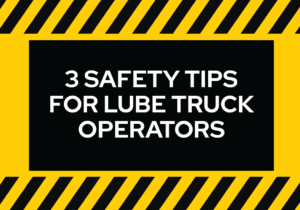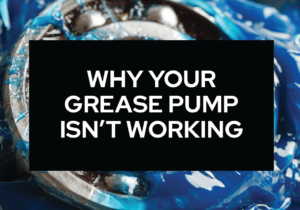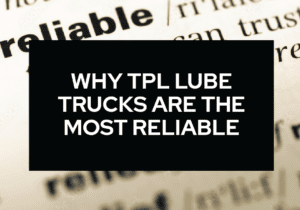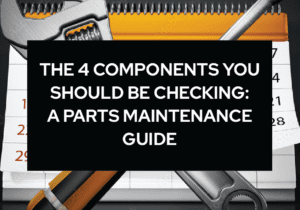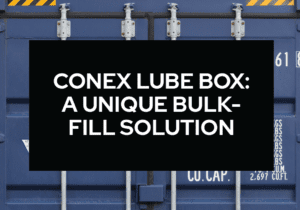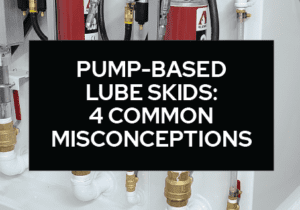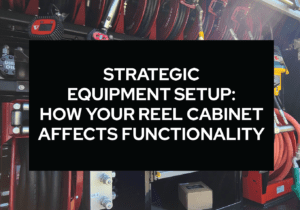3 Safety Tips for Fuel-Lube Truck Owners & Drivers in 2025
Whether you’re a fuel lube truck owner, a fleet manager, or a lube technician, if your New Year’s resolution was to “be healthier,” that also means avoiding injury at work. As industry experts who’ve worked as lube truck techs ourselves, we’re here to remind you of important safety tips to apply in 2025, to help keep you and your crews safe all year long. From a pre-trip inspection checklist to refreshers on how to avoid repeat motion injuries, slips, trips, and falls, we’ll cover all you need to know.
1. Pre-Trip Inspections “For The Win” (FTW!)
We get it: mobile lube techs hope to save daylight, avoid heavy traffic, and meet their requirements to shut down on time. This means doing as much servicing as possible, as quickly as possible. However, completing a quick pre-trip inspection can mean the difference between a successful, efficient workday and a day full of headaches.
In an effort to promote safety across the board, many companies provide both printed and digital pre-trip checklists to their fleet drivers to aid in building the habit of safety even during busy days. However, due to their administrative nature, pre-trip inspections might be forgotten or glossed over by inexperienced drivers, during peak season, and even by tenured owner-operators that know the information by heart. Still, all drivers and techs should aim to perform pre-trip inspections to protect themselves, their equipment, and surrounding team members. Accidents never happen when it’s convenient, and incorporating safety measures can statistically decrease the likelihood of something going awry.
A typical pre-trip checklist includes:
- Testing headlights, brake lights, and amber signals for functionality
- Checking tire condition (wear patterns, pressure, inspect for any damage)
- Ensuring the fire extinguisher and safety reflectors are properly installed and accessible
- Listening for any air leaks from hoses or lines
- Looking for leaks or product spillage around the tanks, inside the reel cabinet, or underneath the chassis
Remember, every driver should complete a thorough pre-trip every time! This is for your safety, the safety of the public, and the longevity of the truck. Also, ensure you have all the proper documents. Check your insurance paperwork, manifest, or bill of lading for cradle-to-grave hazardous material transport.
2. Avoid Repetitive Motion Injuries (RMI) in 2025
According to the Occupational Safety and Health Administration (OSHA), repetitive motion injuries can damage your muscles, skeleton, joints, tendons, and ligaments. RMIs can be very painful and may lead to life-long conditions. These injuries occur in a variety of industries when you do the same physical task often during the workday.|
Common RMIs include:
- Tennis elbow
- Over-exertion stress (back and knee pain)
- Bursitis (joint inflammation from overuse)
- Carpal tunnel
Repetitive motion injuries can start as an unusual ache, sometimes with swelling or occasional, random discomfort. As the weeks, months, and years progress, they become more intense. Eventually, RMIs can be debilitating.
Ways to avoid RMIs before they start:
- Take your breaks on time, and avoid the urge to work through them
- Use proper lifting techniques and equipment
- Wear the right protective equipment when required
- Aim to use good posture while driving, sitting, and standing
- Always use the right tool for the job (if and whenever you can)
So what does this mean for lube technicians? Fuel lube truck drivers face an extra risk of muscle fatigue, which can lead to repetitive motion injuries. Pushing, pulling, and climbing actions can take a toll on your body over time. Implementing RMI-preventative behaviors in 2025 can help you develop safe habits, especially when it comes to the operation of your fuel-lube truck.
Work Injuries from the Employer Perspective
No one wants to experience a painful injury, and they’re unpleasant to imagine. Still, fleet managers, supervisors – and HR specialists, in particular – should be aware of RMI risks. From a strictly business perspective, losing an employee to a work injury is expensive, time-consuming, and frustrating.
Good lube technicians are valuable resources to their companies, and prioritizing their health and safety benefits everyone. Be sure to include some extra safety training for your crews, and consider adding more safety information to your employee handbook this year.
3. Avoid Slips, Trips, and Falls When Operating a Fuel-Lube Truck
According to OSHA, slips, trips, and falls cause nearly 700 workplace fatalities (and many more injuries) every year in the US. Fuel-lube truck drivers face extra risk here, especially if they climb on top of a truck to refill product tanks manually.
As leaders in our industry who are always seeking to innovate in a way that benefits our customers, we recognized this potential safety risk and created a fast-fill manifold option to prevent such injuries in future. With this option, drivers refill the product tanks standing at the back of the truck on the ground. This removes the need to climb up on the truck to refill tanks, reducing the risk of fall injuries and normal joint/muscle fatigue that can lead to RMIs. This option is especially beneficial if you own your lube truck and/or work as a contractor, as your profitability relies entirely on your personal ability to work consistently and efficiently.
Easy ways to avoid slips, trips, and falls include:
- Wear quality footwear (good foundations aren’t just for structures!)
- Clean up spills as quickly as possible
- Keep truck yards, parking lots, garages, and shops tidy
- Coil up electrical cords and hoses and store them immediately after use
- De-ice stairs and ladders during winter months
And most of all, avoid distractions at work. Vow to be “present” during the workday: alert, aware, and involved. Using your phone while operating the truck or servicing heavy equipment is a recipe for trouble. If it’s not an emergency, the best thing to do is save it for break time!
Learn More About TPL and Our Custom Fuel Lube Trucks
Did anything in this article ring especially true for you? Perhaps you’re living with an RMI from years of service, or maybe you’ve endured a fall from the top of a fuel lube truck in the past. If so, we invite you to check out our custom lube trucks and learn more about our safety features!
We’re proud to be a family-owned and operated business, bringing more than three decades of experience to the job. With our reputation for impeccable construction and unmatched operational longevity, our mobile lubrication products are the perfect fit for your organization.
Contact us today to learn more about our custom fuel lube trucks, lube skids, lube systems, water trucks, and more. We look forward to earning your business for decades to come!
RELATED ARTICLES
Answer These 4 Questions Before Buying a Water Truck
Scouting the right water truck for your specific application can be challenging. Our customers often have questions regarding key features of the truck itself: chassis fulfillment, tank capacities, materials used, and production timeline. Today, we explore the four most important questions you should ask when shopping for a water truck. From chassis choices to pumping…
Read MoreTwo-Post vs. Four-Post Automotive Lift: Which Do I Need?
Whether lifting heavy-duty trucks, commercial equipment, or personal vehicles, you need an automotive lift that’s durable, reliable, and suited to your space and needs. Hydraulic two-post and four-post lifts are the most popular options, each offering advantages. One might be better suited for undercarriage access, while the other might be better for storage and stability.…
Read More3 Safety Tips for Fuel-Lube Truck Owners & Drivers in 2025
Whether you’re a fuel lube truck owner, a fleet manager, or a lube technician, if your New Year’s resolution was to “be healthier,” that also means avoiding injury at work. As industry experts who’ve worked as lube truck techs ourselves, we’re here to remind you of important safety tips to apply in 2025, to help…
Read MoreWhy Your Grease Pump Isn’t Working
New year, new … grease pumps? Not necessarily! As 2024 rolls in and we all get back into our routines, it’s common to encounter equipment issues leftover from December – you know, the ones where we all said, “Eh, I’ll just handle it next year!” But now, that malfunctional grease pump is slowing – or…
Read MoreWhy TPL Lube Trucks Are The Most Reliable
Reliability (noun): “performing consistently well, to a degree which the result can be depended on.” When you have a lube truck, skid, or system, reliability is a product characteristic that isn’t just expected – it’s non-negotiable. Your fluid exchange equipment needs to work reliably. But what does that mean to have a reliable lube truck? 1. It has to…
Read MoreThe Four Main Components You Should Be Checking: A Parts Maintenance Guide
As temps continue to rise across the country, summer is in full swing – often translating into increased performance demand on your teams and their equipment. While it may seem counter-productive to put extra time towards equipment maintenance, performing regular service on your PM equipment is vital to keep them running effectively and efficiently, especially…
Read MoreConex Lube Box: A Unique Bulk Fill Solution
Parallel to lube trucks and skids, businesses sometimes need a long-term (but not permanent) on-site, bulk-fill and bulk storage solution. Something with security, large holding capacity, and the option for unique customizations like work benches and tool cabinets. For over 20 years, Taylor Pump and Lift has been offering solutions like this repurposed Conex box…
Read MorePump-Based Lube Skids: Four Common Misconceptions
Lube skids are used in almost every industry across the country – fueling and greasing everything from airplanes and tractor trailers, to construction and farm equipment. As a staple pieces of service equipment, it’s imperative that business owners and technicians alike are familiar with how the function and form of each lube skid component impacts…
Read MoreStrategic Equipment Setup: How Your Lube Truck Reel Cabinet Affects Functionality
Much like a house, the layout of your lube truck and reel cabinets can either hinder – or improve – your productivity. During our build process, we identify the quantity and types of lube products you need. Based on that assessment, we construct your lube truck with optimal functionality in mind. QUESTIONS TO ASKOften times,…
Read MoreConstruction Boom & The Need For More-Efficient Lube Solutions
As the world continues to bounce back economically from the last two years of pandemic, the construction industry is expected to jump 4% in 2021 – totaling an additional $32B – and then another 8% in 2022, says ForConstructionPros.com. Commercial construction – which represents 30% of the total construction industry nationwide – is expected to grow…
Read More


